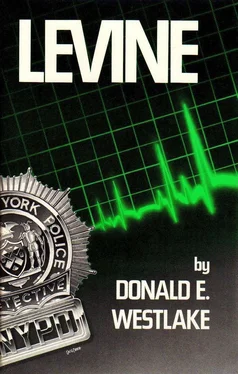“Police,” Levine told him. He opened his wallet and held it up for the face to look at.
“Oh,” said the face. “Sure thing.” The door shut, and Levine waited while the chain was clinked free, and then the door opened wide.
The super was a short and round man, dressed in corduroy trousers and a grease-spotted undershirt. He wheezed, “Come in, come in,” and stood back for Levine to come into his crowded and musty-smelling living room.
Levine said, “I want to talk to you about Al Gruber.”
The super shut the door and waddled into the middle of the room, shaking his head. “Wasn’t that a shame?” he asked. “Al was a nice boy. No money, but a nice boy. Sit down somewhere, anywhere.”
Levine looked around. The room was full of low-slung, heavy, sagging, over-stuffed furniture, armchairs and sofas. He picked the least battered armchair of the lot, and sat on the very edge. Although he was a short man, his knees seemed to be almost up to his chin, and he had the feeling that if he relaxed he’d fall over backwards.
The super trundled across the room and dropped into one of the other armchairs, sinking into it as though he never intended to get to his feet again in his life. “A real shame,” he said again. “And to think I maybe could have stopped it.”
“You could have stopped it? How?”
“It was around noon,” said the super. “I was watching the TV over there, and I heard a voice from the back apartment, shouting, ‘Al! Al!’ So I went out to the hall, but by the time I got there the shouting was all done. So I didn’t know what to do. I waited a minute, and then I came back in and watched the TV again. That was probably when it was happening.”
“There wasn’t any noise while you were in the hall? Just the two shouts before you got out there?”
“That’s all. At first, I thought it was another one of them arguments, and I was gonna bawl out the two of them, but it stopped before I even got the door open.”
“Arguments?”
“Mr. Gruber and Mr. Perkins. They used to argue all the time, shout at each other, carry on like monkeys. The other tenants was always complaining about it. They’d do it late at night sometimes, two or three o’clock in the morning, and the tenants would all start phoning me to complain.”
“What did they argue about?”
The super shrugged his massive shoulders. “Who knows? Names. People. Writers. They both think they’re great writers or something.”
“Did they ever get into a fist fight or anything like that? Ever threaten to kill each other?”
“Naw, they’d just shout at each other and call each other stupid and ignorant and stuff like that. They liked each other, really, I guess. At least they always hung around together. They just loved to argue, that’s all. You know how it is with college kids. I’ve had college kids renting here before, and they’re all like that. They all love to argue. Course, I never had nothing like this happen before.”
“What kind of person was Gruber, exactly?”
The super mulled it over for a while. “Kind of a quiet guy,” he said at last. “Except when he was with Mr. Perkins, I mean. Then he’d shout just as loud and often as anybody. But most of the time he was quiet. And good-mannered. A real surprise, after most of the kids around today. He was always polite, and he’d lend a hand if you needed some help or something, like the time I was carrying a bed up to the third floor front. Mr. Gruber come along and pitched right in with me. He did more of the work than I did.”
“And he was a writer, wasn’t he? At least, he was trying to be a writer.”
“Oh, sure. I’d hear that typewriter of his tappin’ away in there at all hours. And he always carried a notebook around with him, writin’ things down in it. I asked him once what he wrote in there, and he said descriptions, of places like Prospect Park up at the corner, and of the people he knew. He always said he wanted to be a writer like some guy named Wolfe, used to live in Brooklyn too.”
“I see.” Levine struggled out of the armchair. “Thanks for your time,” he said.
“Not at all.” The super waddled after Levine to the door. “Anything I can do,” he said. “Any time at all.”
“Thanks again,” said Levine. He went outside and stood in the hallway, thinking things over, listening to the latch click in place behind him. Then he turned and walked down the hallway to Gruber’s apartment, and knocked on the door.
As he’d expected, a uniformed cop had been left behind to keep an eye on the place for a while, and when he opened the door, Levine showed his identification and said, “I’m on the case. I’d like to take a look around.”
The cop let him in, and Levine looked carefully through Gruber’s personal property. He found the notebooks, finally, in the bottom drawer of the dresser. There were five of them, steno pad size loose-leaf fillers. Four of them were filled with writing, in pen, in a slow and careful hand, and the fifth was still half blank.
Levine carried the notebooks over to the card table, pushed the typewriter out of the way, sat down and began to skim through the books.
He found what he was looking for in the middle of the third one he tried. A description of Larry Perkins, written by the man Perkins had killed. The description, or character study, which it more closely resembled, was four pages long, beginning with a physical description and moving into a discussion of Perkins’ personality. Levine noticed particular sentences in this latter part: “Larry doesn’t want to write, he wants to be a writer, and that isn’t the same thing. He wants the glamour and the fame and the money, and he thinks he’ll get it from being a writer. That’s why he’s dabbled in acting and painting and all the other so-called glamorous professions. Larry and I are both being thwarted by the same thing: neither of us has anything to say worth saying. The difference is, I’m trying to find something to say, and Larry wants to make it on glibness alone. One of these days, he’s going to find out he won’t get anywhere that way. That’s going to be a terrible day for him.”
Levine closed the book, then picked up the last one, the one that hadn’t yet been filled, and leafed through that. One word kept showing up throughout the last notebook. “Nihilism.” Gruber obviously hated the word, and he was also obviously afraid of it. “Nihilism is death,” he wrote on one page. “It is the belief that there are no beliefs, that no effort is worthwhile. How could any writer believe such a thing? Writing is the most positive of acts. So how can it be used for negative purposes? The only expression of nihilism is death, not the written word. If I can say nothing hopeful, I shouldn’t say anything at all.”
Levine put the notebooks back in the dresser drawer finally, thanked the cop, and went out to the Chevy. He’d hoped to be able to fill in the blank spaces in Perkins’ character through Gruber’s notebooks, but Gruber had apparently had just as much trouble defining Perkins as Levine was now having. Levine had learned a lot about the dead man, that he was sincere and intense and self-demanding as only the young can be, but Perkins was still little more than a smooth and blank wall. “Glibness,” Gruber had called it. What was beneath the glibness? A murderer, by Perkins’ own admission. But what else?
Levine crawled wearily into the Chevy and headed for Manhattan.
Professor Harvey Stonegell was in class when Levine got to Columbia University, but the girl at the desk in the dean’s outer office told him that Stonegell would be out of that class in just a few minutes, and would then be free for the rest of the afternoon. She gave him directions to Stonegell’s office, and Levine thanked her.
Читать дальше






